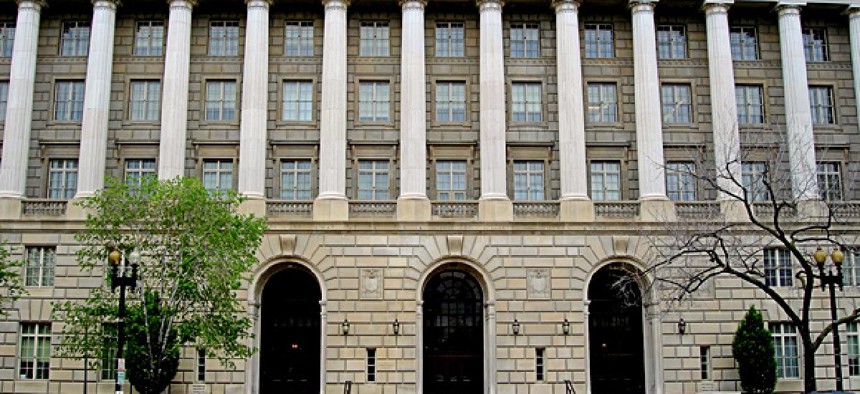
IRS headquarters Flickr user EclecticBlogs
IRS Anticipates Furloughs
Employees face up to 7 days’ of unpaid leave this year under sequester.
The Internal Revenue Service estimates employee furloughs of between five and seven days beginning this summer because of sequestration, according to the agency’s acting commissioner.
Salaries are “by far” the agency’s greatest expense, making furloughs necessary if the automatic spending cuts occur and remain in effect, said Acting Commissioner Steven T. Miller on Thursday. “Let me be clear: We know that asking you to take even one furlough day is difficult,” said Miller in a Feb. 28 email to employees. “That’s why we’ve spent so much time and energy trying to minimize the impact on our employees as much as possible while carrying out our mission.”
Miller anticipates that employees will take no more than one furlough day per period, beginning in the summer, after tax filing season ends, and possibly lasting through the end of fiscal 2013 “for a total of between five to seven furlough days.” Employees will receive notices 30 days in advance of their scheduled furloughs.
The IRS hopes that by scheduling furloughs to begin in the summer that it will head off a disruption in work flow during the agency’s busiest season. “We recognize how distracting and difficult this news may be, but we know that you and your colleagues are dedicated public servants who will continue to deliver for the nation’s taxpayers,” Miller told employees in the email.
IRS, like many other agencies, is scouring its budget for savings to comply with the sequester, which begins Friday. IRS will continue its current hiring freeze, reduce funding for grants and other expenditures, cut costs in areas including travel, training, facilities and supplies, and review contract spending “to ensure only the most critical and mandatory requirements are fully funded,” Miller’s email stated.
The acting commissioner also told employees the agency will work with the National Employees Treasury Union “to ensure that any necessary furloughs are applied in a fair and appropriate manner and consistent with our collective bargaining agreements.” NTEU President Colleen Kelley said the union has talked informally with the IRS, and will begin bargaining discussions when the agency officially provides notice that it intends to furlough workers. Agencies are required to meet with unions before they send out furlough notices to employees.
“IRS employees are middle class workers who have had their pay frozen for over two year,” Kelley said. “Those furloughs will hurt their ability to pay their bills and serve the public.” IRS employees from across the country spoke earlier this week during NTEU’s legislative conference in Washington about how sequestration and possible furloughs could affect them and their agency. Kelley said the IRS is operating with 5,000 fewer employees during this tax filing season than two years ago. The sequester and resulting employee furloughs could delay the processing of tax returns and refunds.
Kelley said the potential need to issue furloughs because of the sequester and the threat of a government shutdown at the end of March is “incredibly unfair” to federal workers and the public. The current continuing resolution keeping the government open expires on March 27. It’s possible Congress will deal with sequestration in whatever agreement they make on extending the CR during the next few weeks.
NEXT STORY: Senate Puts Fed Pay Freeze Proposal on Ice







